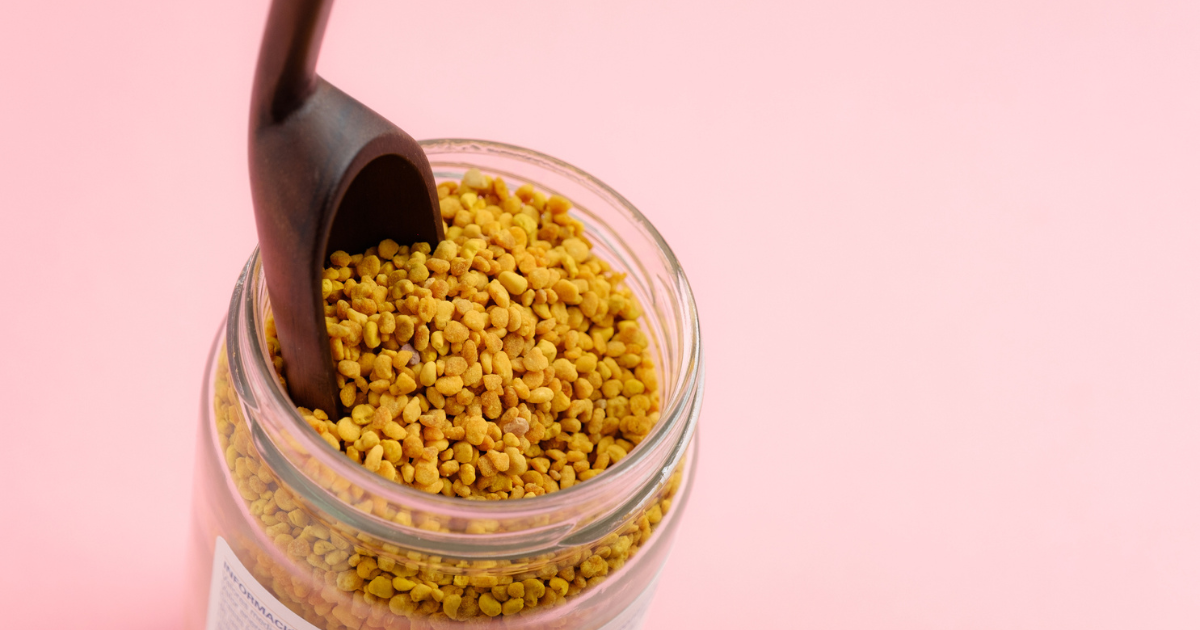Top 5 benefits of bee pollen supplements

Have you heard the buzz about bee pollen? Collected by honeybees from flowering plants, pollen is revered for its purported health benefits. Lately, bee pollen supplements have been trending on social media. While some health claims have no scientific proof, such as bee pollen correlating with increased breast size, there are plenty of potential benefits with bee pollen supplements, from boosting immunity to skin health.
“Bee pollen is a nutraceutical or a superfood,” says Dan Ramirez, PharmD, Nebraska Medicine outpatient pharmacist. “It’s a natural food that’s not regulated but contains many proven beneficial components that make it attractive to use as a healthy dietary supplement.”
What’s in bee pollen, and how is it taken?
Bee pollen has a rich nutritional profile with an array of vitamins, minerals, enzymes, amino acids and antioxidants. Vitamins B, C and E, zinc and beta-carotene make bee pollen valuable for supporting health and well-being.
“Some resources say the dosage for bee pollen supplements can be about 7.5 grams for an adult – about three to five teaspoons of dry product – to make a difference in someone’s health,” says Dr. Ramirez. “Vitamins are regulated as supplements, so the potency is guaranteed on the bottle. Bee pollen is unregulated, so it’s marketed as a food.”
Bee pollen isn’t recommended for those with seasonal allergies since it’s a natural flower product. Here are some of the top science-backed benefits of taking bee pollen supplements:
Antioxidant protection
A widely known benefit of bee pollen is its antioxidant activity. Antioxidants help neutralize harmful free radicals and protect cells from damage due to aging, the sun, certain toxins, and diseases. Studies show bee pollen has high levels of flavonoids, polyphenols and carotenoids. Those who take bee pollen supplements may have lower oxidative stress and stronger cellular health.
Anti-inflammatory properties
Flavonoids and phenolic acids like those found in bee pollen have been scientifically shown to reduce inflammation in the body. These can help mitigate symptoms associated with inflammatory illnesses.
“Reducing inflammation is key to preventing and helping treat so many common disease states,” explains Dr. Ramirez. “One of the most newfound and current topics is a disease state in the United States we believe might be linked to obesity: nonalcoholic fatty liver disease or NAFLD. Relatively healthy people presenting with increased liver enzymes, characteristic of inflammation. Bee pollen contains the components to combat inflammation.”
Wound healing
Bioactive compounds and the nutritional components of bee pollen can help heal wounds and prevent infections. Bee pollen contains proteins, amino acids, vitamins and the minerals necessary for healing damaged cells and rebuilding new tissues. Because of its anti-inflammatory effects, bee pollen could help speed up wound healing. Bee pollen has chemical compounds to regulate the immune system and activate the body’s defense system.
Boosted immune system
Supercharge your immune system with bee pollen! One of the most researched benefits of bee pollen is its natural chemical compounds that help regulate the immune system. Bee pollen contains plenty of healthy, diverse vitamins that could help your body ward off pathogens and harmful substances.
Ease menopausal symptoms
Menopause causes many uncomfortable and sometimes debilitating symptoms, such as hot flashes, night sweats and mood changes. Historically, some folk remedies have noted sleep improvements, lessened joint pains and boosted mood and energy. So far, bee pollen shows promise in helping manage minor menopausal symptoms. It’s important to talk to your doctor about major symptoms or physical changes.
What else to know about bee pollen supplements
Dr. Ramirez says taking local bee pollen may have different advantages over bee pollen sourced from other regions.
“Bee pollen is completely different depending on location, preparation, batch, vendor and regulatory laws,” he says. “We’re potentially getting different vitamins and antioxidants. Those differences in our diets are generally beneficial and can vary based on location.”
Bee pollen composition also varies based on the plants and flowers available in different areas. Additionally, taking local bee pollen means supporting local beekeepers who help conserve bee populations and ecosystems. Bee pollen supplements can be purchased at most grocery stores, farmers markets and online retailers.
“Bee pollen is widely available because it’s not marketed as a nutritional supplement but as a food,” says Dr. Ramirez. “It’s collected and sold as a food, so the FDA doesn’t consider it a supplement.”
Dr. Ramirez emphasizes the benefits of bee pollen but also the overall significance of bees.
“Bees are such a vital part of society and our entire ecosystem,” he explains. “Any press that shows how important they are is great. We need to take care of bees by reducing and being mindful of pollution, especially in the farming industry, and ensuring any bee product is safely and sustainably sourced.”





